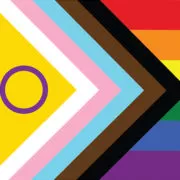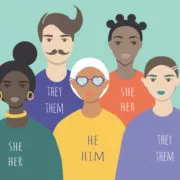If you want to be there for your friend during this important time in their life, you’ve come to the right place! While there is no one “right” answer to every situation you might encounter, these tips should help you on your way.
#1 – Be patient
If your friend is questioning or exploring their sexual or romantic identity, it may take some time for them to figure out what’s true for them. They might use one label for a while, and then decide at a later time to use a different one. It’s normal for a person’s orientation to change over their lifetime. Respect your friend’s identity, no matter whether it changes or stays the same. They are the one who knows themselves best!
#2 – Respect your friend’s identity
LGBTQIA+ people use many different terms to describe their identities (queer, bi, pansexual, etc.). Use the same words that your friend uses to describe themselves. If your friend is not sure which identity label fits them best, let them figure it out for themselves. Don’t tell them which term you think they should use. Your friend’s sexual and romantic orientation is theirs alone to define.
#3 – Don’t “out” your friend to others
Your friend’s sexual or romantic orientation is personal information that they may or may not feel comfortable sharing with others. Don’t gossip about them or tell everyone about your “gay best friend.” The world is unfortunately still very intolerant of LGBTQIA+ people. Outing someone could cause them to lose their jobs, housing, friends, or put them in danger of physical violence.
#4 – Think before you ask a question or give advice
Avoid asking insensitive and personal questions like:
- “Do you have a crush on me?”
- “How do you have sex?”
- “Who’s the girl and who’s the boy in the relationship?”
- “Are you sure you know you’re a lesbian.” Or “You’re so masculine, are you sure you’re gay?”
- “How do you know you’re asexual if you’ve never had sex?”
- “When did you ‘decide’ to be gay?”
- “What happened to you? You’ve changed.”
- “But you’re not actually bisexual, you’re really just gay, or you’re really just straight, right?”
Accept your friend for who they are, and don’t treat them any differently than you would treat any other friend. Search online or read books to find out why these questions are problematic. If your friend wants to talk to you about any of these topics, they will.
Even if you are trying to be supportive, comments like these can be hurtful or even insulting:
- “I would never have known you were gay. You seem so straight.”
- “You’re too pretty to be a lesbian.”
- “You’re so brave.”
- “I’ll pray for you.”
- “Bisexuality is just a phase.”
- “Of course you’re gay! You’re so well dressed.”
- “I like you. You’re not like those other gays.”
- “You’re queer?! That is so cool.”
- “You’re my gay best friend.”
#5 – Educate yourself
The best way to get educated is by listening with an open mind to LGBTQIA+ people speaking for themselves. Check out books, films, YouTube channels, and blogs to find out more about LGBTQIA+ people around the world and the issues people within the community face. Follow LGBTQIA+ thought leaders on social media.
Books to check out:
- LGBTQ: The Survival Guide for Lesbian, Gay, Bisexual, Transgender, and Questioning Teens by Kelly Huegel Madrone
- Proud: Stories, poetry and art on the theme of pride by Juno Dawson
- Revolutionary Voices: A Multicultural Queer Youth Anthology by Amy Sonnie
- All Out: The No-Longer-Secret Stories of Queer Teens throughout the Ages by Saundra Mitchell
- Queer, There, and Everywhere: 23 People Who Changed the World by Sara Prager
- Queerly Autistic: The Ultimate Guide for LGBTQIA+ Teens on the Spectrum by Erin Ekins.
For more book recommendations, check out the amazing Queer Books For Teens website.
LGBTQ+ Resources Online
Websites like The Trevor Project, GLAAD, PFLAG, and HRC feature articles and guidance for and by LGBTQ+ youth. If your friend is from a religious family or community, you might find one of these guides for LGBTQ+ Catholics, Evangelical Christians, Jews, Mormons, or Muslims useful. There’s also a fantastic guide by and for Muslim youth called “I’m Muslim and I Might Not Be Straight”. Visit our resource section for trans and questioning youth for books, articles, and videos on transgender topics.
Neurodiversity & Neurodivergence
Annie Elainey is an empowering, Latinx, Youtuber and a neurodivergent member of the LGBTQ+ community. Websites like Twainbow and ProjectLets provide support, guidance, and resources for neurodivergent individuals, including those with specific learning, physical, and mental health needs.
#6 – Stand up for LGBTQIA+ rights
- Challenge homophobic and anti-trans jokes and remarks — whenever they’re said and no matter who says them.
- Join your local GSA or PFLAG chapter and team up with other allies.
- Advocate for all-gender restrooms at your school. The Trans* Teen Project has a resource page to help you get started.
- Find out what you can do to make your sports team truly trans-inclusive. Transathlete.com has a lot of useful resources and information.
- Be an ally for LGBTQIA+ teens who are neurodivergent (PTSD, autism-spectrum, ADD, OCD, learning differences, etc.) and may identify as neuroqueer. They may be at risk for even greater social isolation, due to discrimination, and may need allies like you.
#7 – Know your own limits
When we’re learning and growing, we all make mistakes. If you don’t know something, it’s always better to admit that rather than making assumptions or saying something that may be incorrect or hurtful. Keep educating yourself and remember that being an ally is an ongoing journey of learning and taking action.














